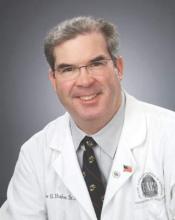I was in the surgeons’ lounge in the middle of the night – waiting, as we surgeons so often do. I plucked my phone from my pocket to see what was happening on the ACS Communities. Sure enough, another surgeon was up at night somewhere contemplating a case, another was railing against a CEO, and yet another was considering entering into an employment contract. All of them were asking the same question, “What do you think?” of their College. By College, I am not referring to the leadership or the staff but to that intangible entity that lives in the heart of every Fellow of the College. It consists of old residency friends, mentors, policy makers, new surgeons, and old surgeons. All share a common, decent desire to be not just a surgeon but also a great surgeon by whatever definition one happens to hold sacred.
I smiled to myself and shook my head. From the lonely moments before an emergency case, I had a quick dose of reassurance that I was not alone, that I was a part of something bigger than myself, and that many surgeons were and are doing exactly what I do every day. Those surgeons are truly a community.
As with any community, the participants of the ACS Communities are diverse and the viewpoints and knowledge among them vary widely. But all of them have a sense that their experience, knowledge, skills, tricks of the trade, and philosophic thoughts transcend to a common purpose for the good of the patients and the profession. One can lose sight of this in the hurly-burly world of surgery, which has so much drama inherently in its performance.
ACS Communities is about a year old now and almost all Fellows belong to at least one Community in the system. This project was in the pipeline for several years. The origin of the Communities idea extends back to the 1990s. It was the brainchild of Fellows George Sheldon, Tom Russell, and David Hoyt, who all realized that honest and open communication breeds understanding and mutual respect. But none of us involved in this effort to develop the Communities really knew what the impact would be on the American College of Surgeons or the surgical community at large. Reminiscent of the first telegraph message, as the system was turned on live I thought, “What hath God wrought?” For, in fact, communication at the speed of light among 60,000 surgeons is a bit like lighting a match in a dynamite factory. You might get to see what is in a previously dark room, but you could also get an explosive result.
As Editor in Chief of the system (with the able support of Jerry Schwartz at the Chicago ACS headquarters), I’ve read essentially every one of the now thousands of posts placed into the system. Having spent some time in the company of surgeons, I was prepared for their propensity for intense expression of their views. But I was amazed to discover that while discussions in the Communities are frequently very … ah … frank, foul language and nasty comments against individuals are rare. There have been a few exceptions but it is usually a surgeon writing in the heat of the moment and temporarily forgetting that once the send button activates, there’s no way to take it back. So, I would say the great majority of conversations have been frank without being unprofessional.
Just as you can’t believe many things you read on the Internet, you can’t believe everything you read from other surgeons. When clinical cases are discussed, one frequently sees widely divergent opinions. Some of the posts are of dubious value, while others are cutting-edge ideas from world-class experts. I would advise that when posting a case (always with an eye to avoiding a HIPAA violation) that participants look at the entire range of responses. From that variety of responses, you usually see the best course. Sometimes, it is obvious there isn’t a “right” answer but several reasonable ones.
Politics rears its ugly head frequently on the General Surgery Community. Interestingly, the specialty communities tend to be strictly professional in discussing cases, training, and surgical judgment. In the realm of the political, the discussions demonstrate some of the best and worst in us. One can see that College participants are similar to the general public in that they are usually about equally divided on any single issue. This means that inflexible positions taken by the College leadership favoring a particular point of view is likely to annoy about half of the Fellows. But a few opinions are almost universally voiced: a general hatred of EMR/EHRs (despite the knowledge that if they worked right as clinical documents, surgeons would love EHRs), dissatisfaction with government regulation no matter what the regulation, admiration of their mentors, and a shared belief that salaried employment is rapidly becoming the norm of surgical life.

